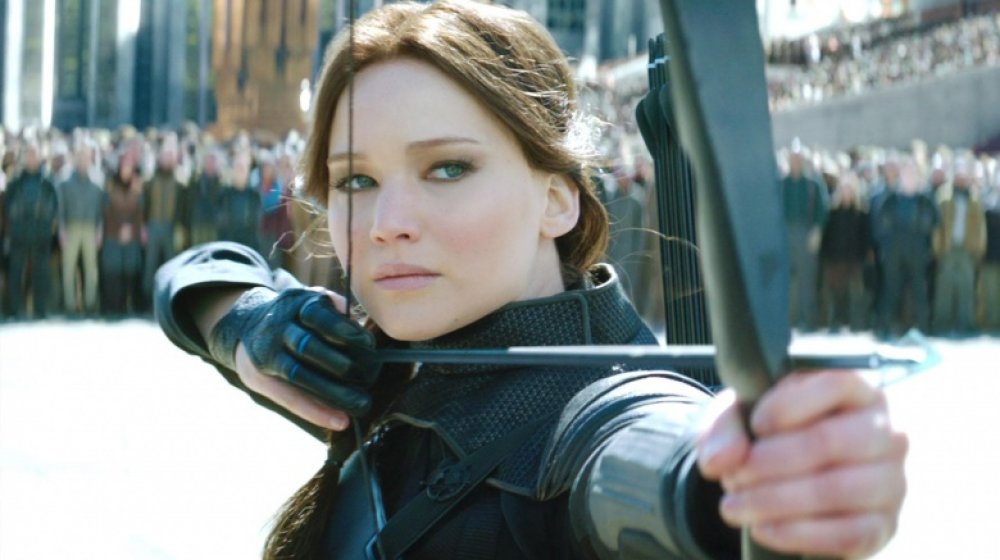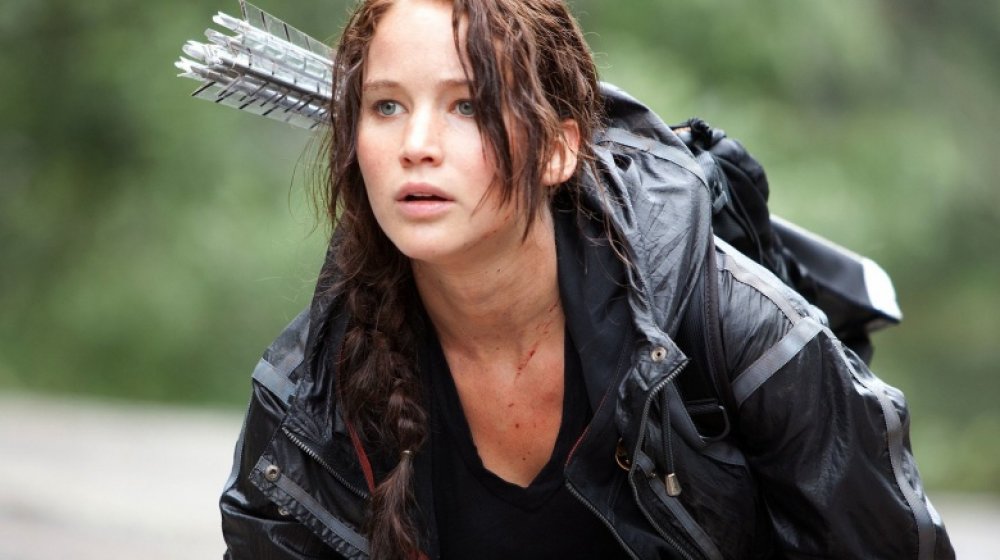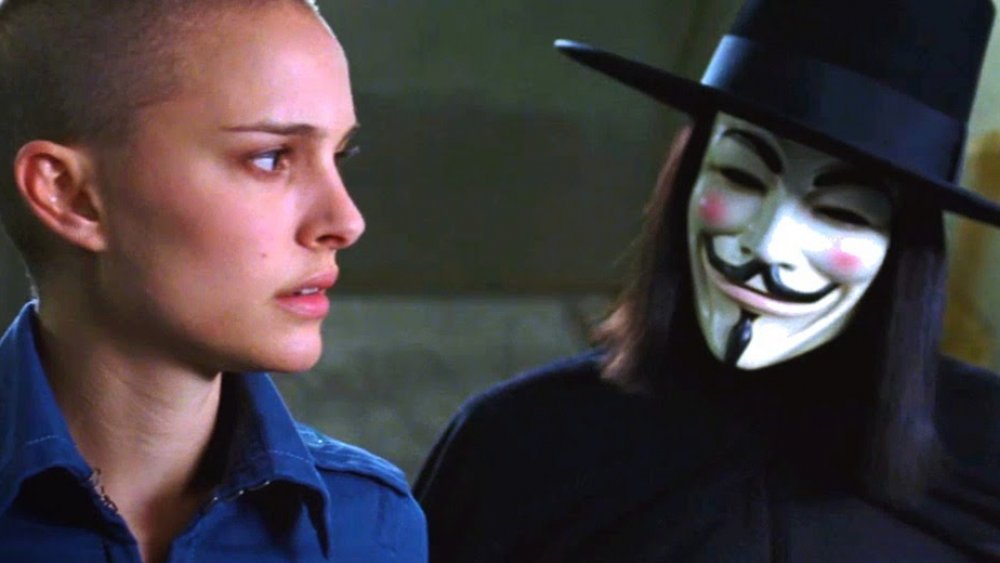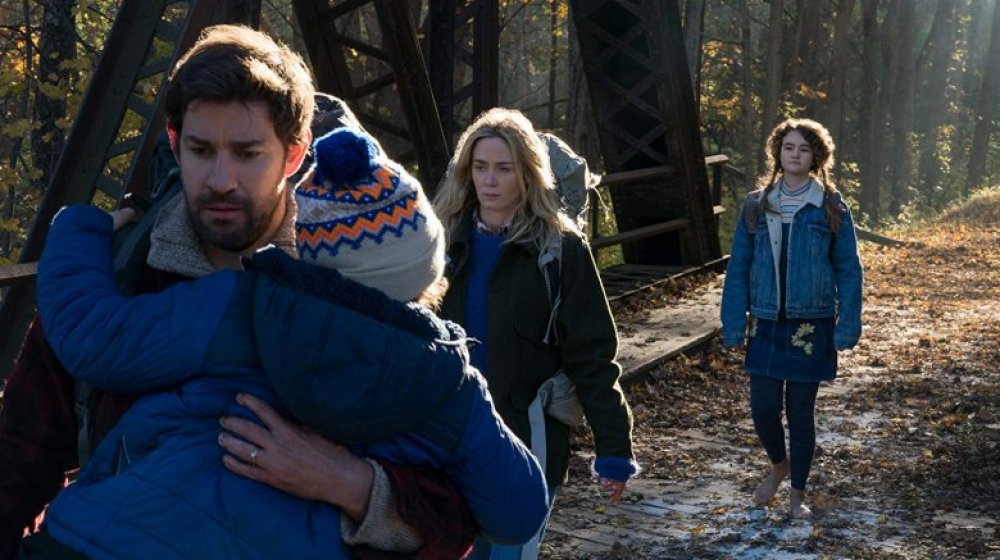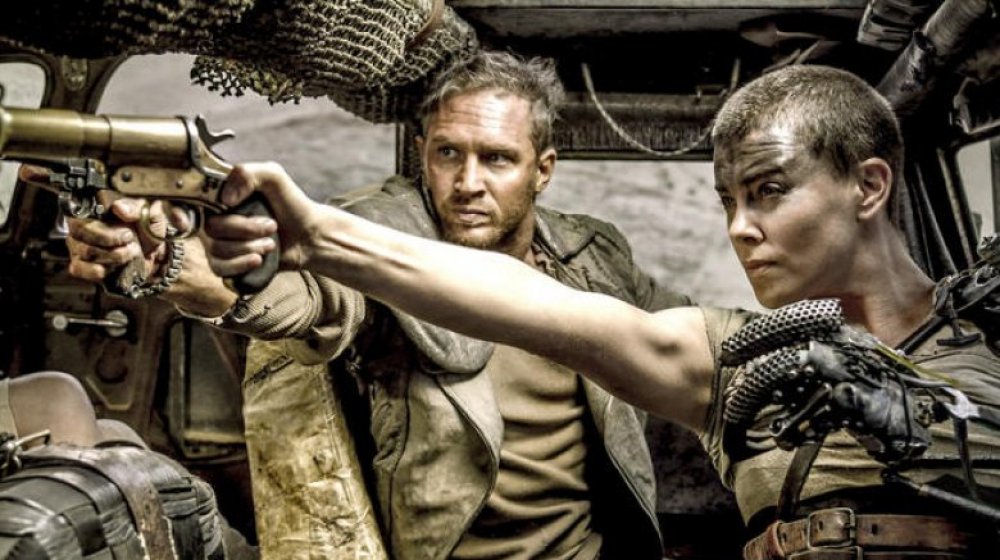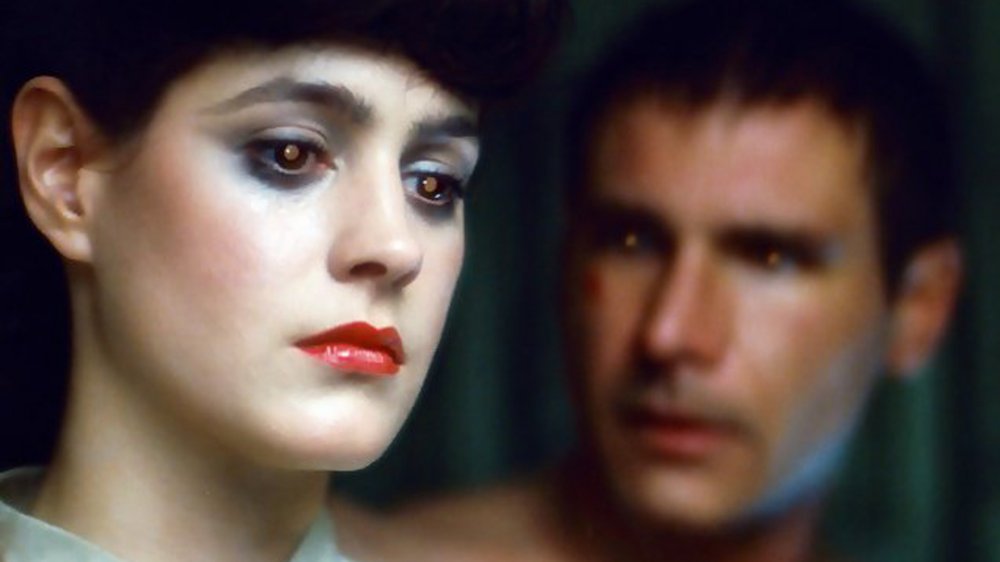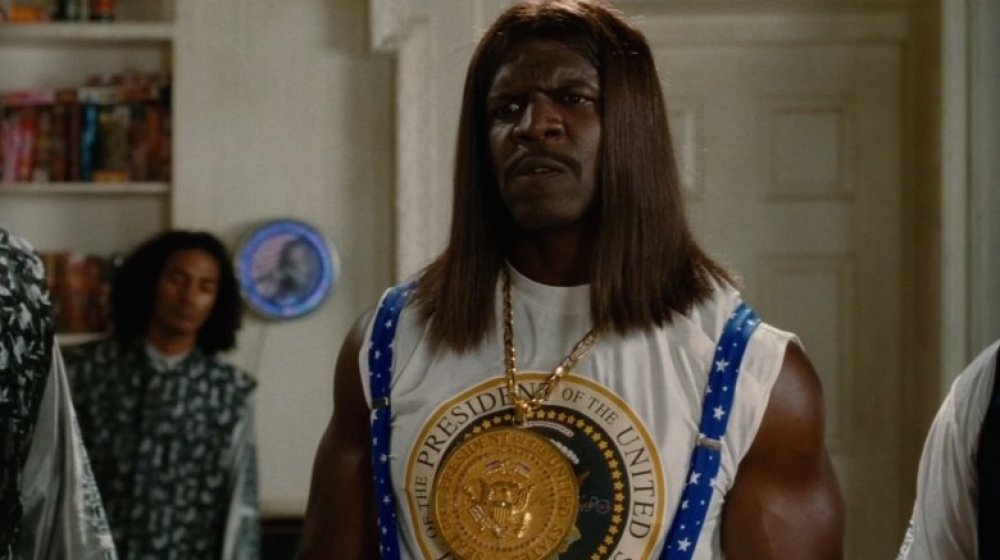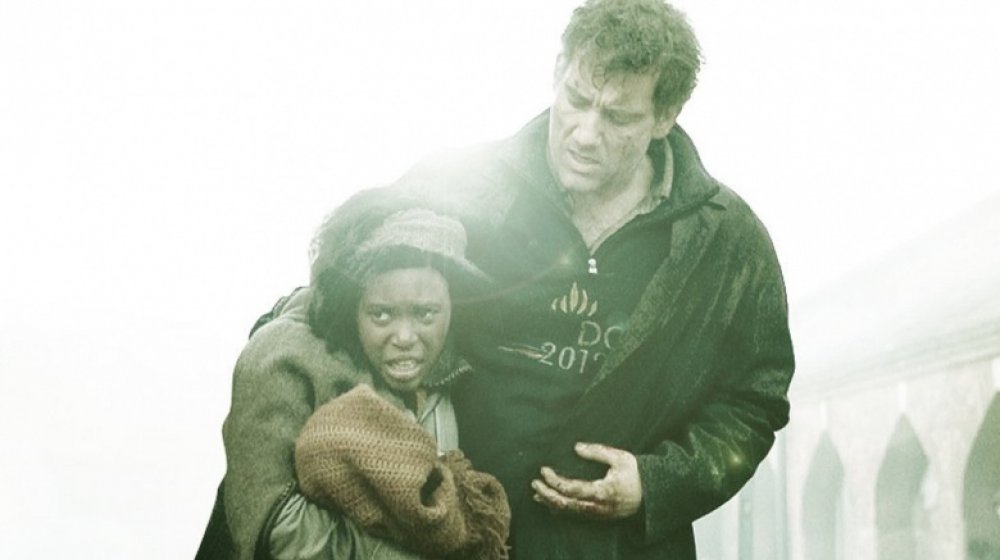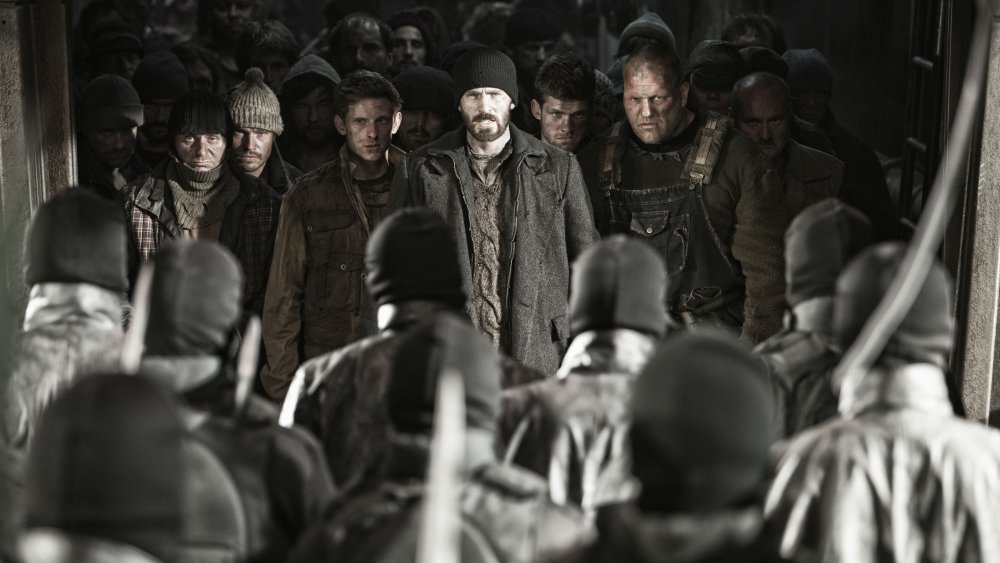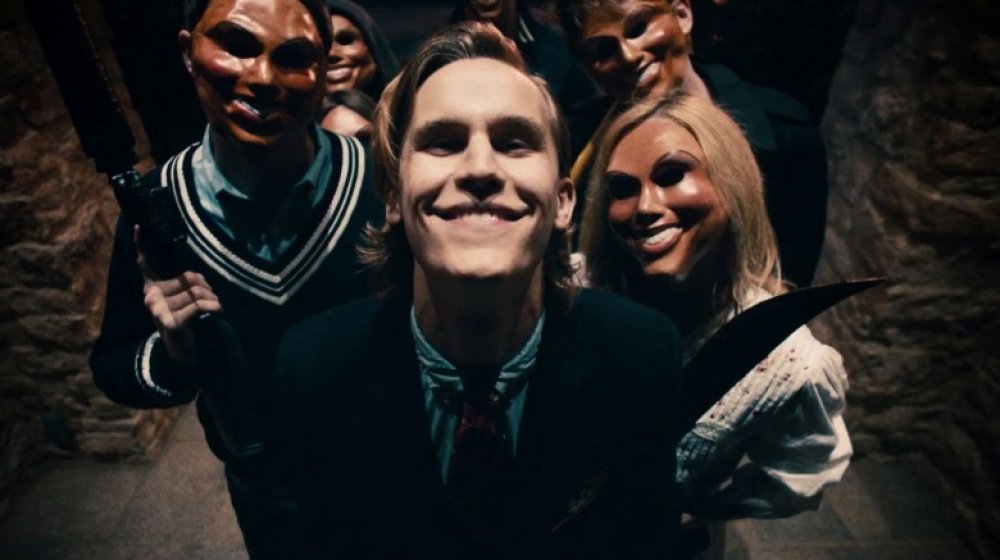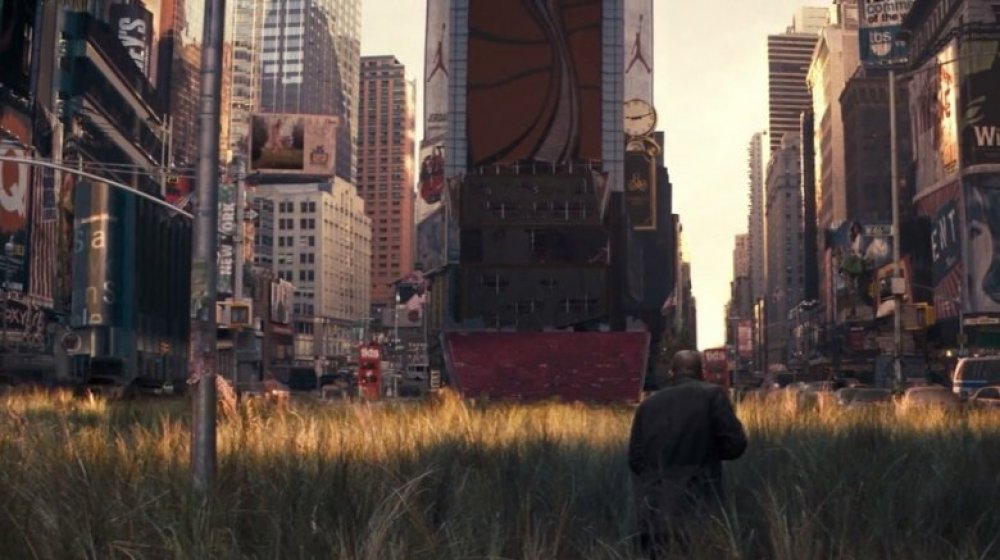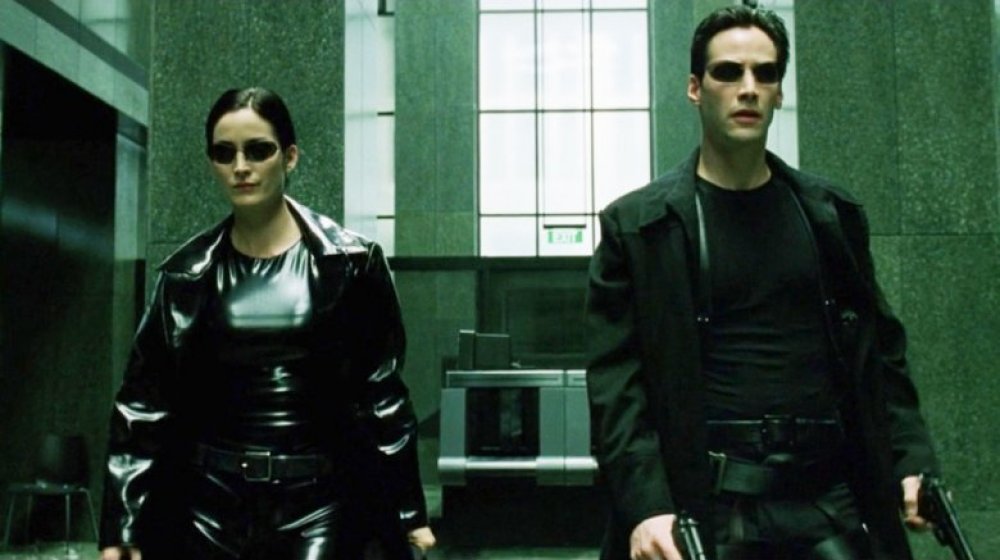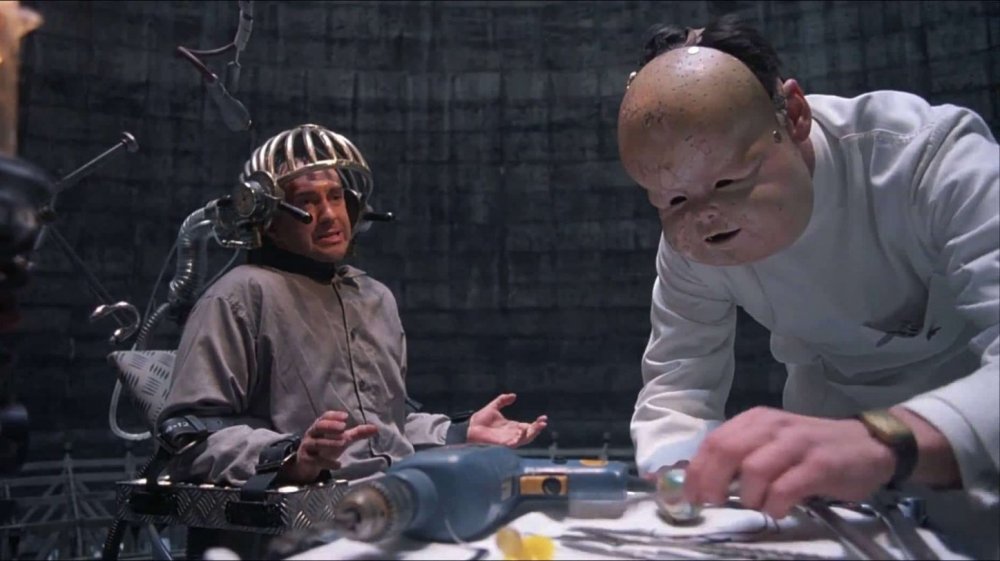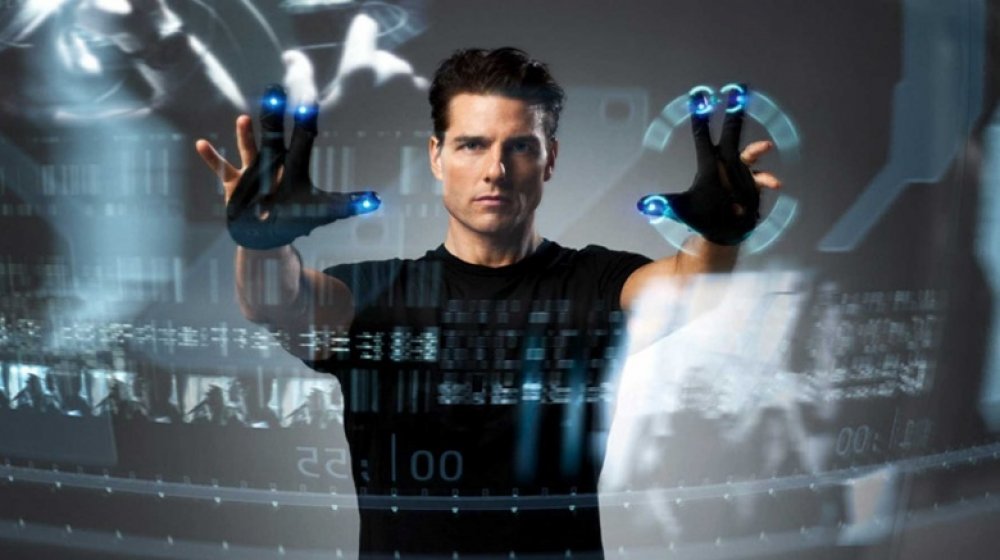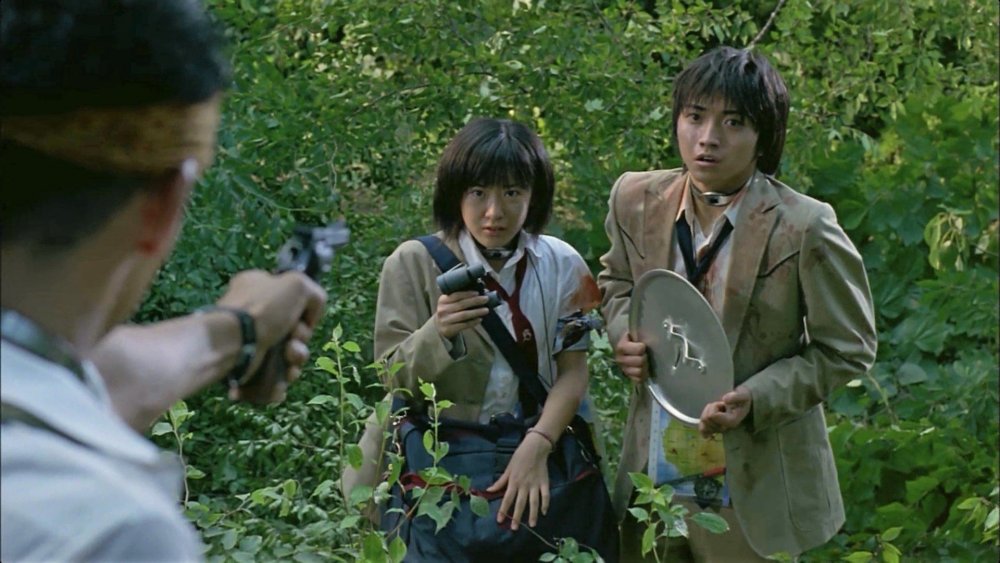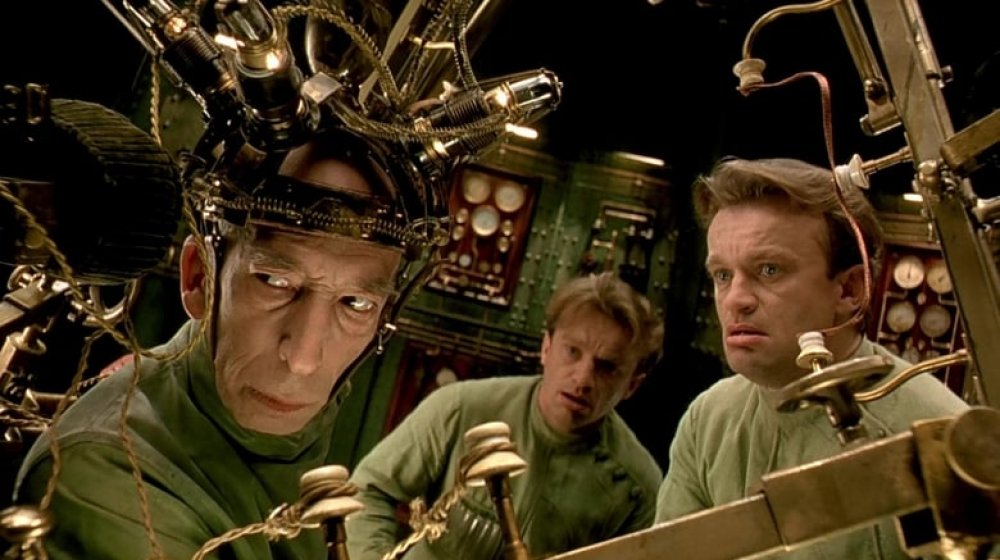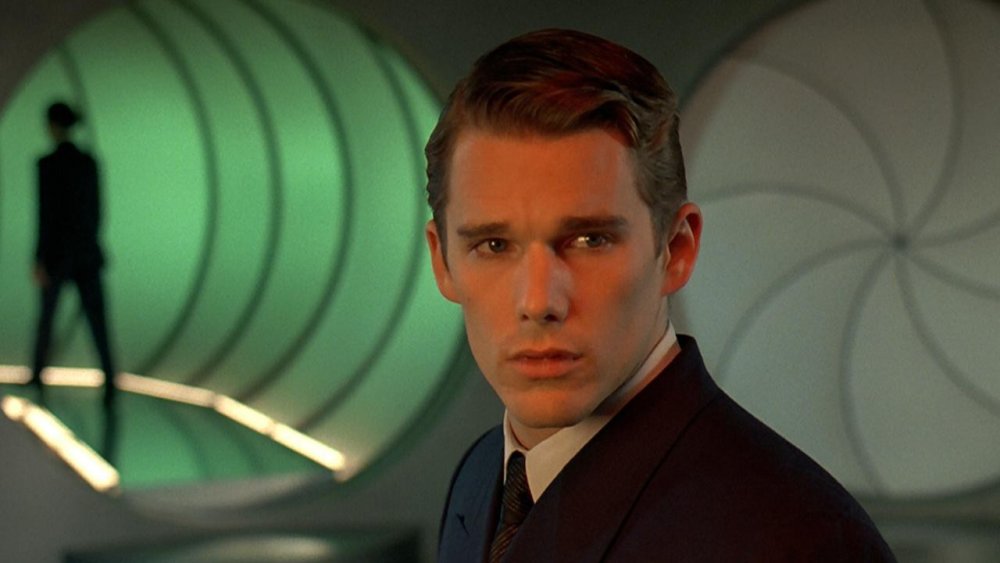The Best Dystopian Movies To Watch Right Now
We've all seen disaster movies, whether they're about a sudden real-world event like a tsunami or earthquake or focused on a fictional zombie outbreak, but what happens after those disasters? After the world falls apart, new orders often take control, and in movies, that's typically not a good thing, as people looking for power swoop in and take over a damaged, broken society, creating a dystopia. The opposite of an ideal utopia, the word "dystopia" means "an imagined world or society in which people lead wretched, dehumanized, fearful lives," and while none of us would ever want to live in one of these worlds, there's plenty of pop culture depicting what any number of dystopian scenarios could look like.
From a world where children fight to the death to protect their families to monsters that attack at the smallest noise, mass infertility, and virtual realities, there are all kinds of dystopian worlds you can experience without having to live them in real life. Here are the best dystopian movies you can watch right now.
The Hunger Games
Before Jennifer Lawrence became an Oscar darling, she had a huge hit on her hands with the Hunger Games franchise, based on the bestselling series of young adult novels by Suzanne Collins. As Katniss Everdeen, a tough, disenfranchised girl living in one of the poorest districts of Panem — a redrawn version of the United States that only benefits the wealthy — Lawrence took on a multi-film challenge, playing a girl who volunteers as a "tribute" in the dangerous annual Hunger Games in her sister's stead. During the Games, two children are chosen from each of the 12 districts, and only one leaves the arena, reminding the citizens of Panem that the all-powerful Capitol controls every aspect of their lives — but when Katniss joins the fray, she threatens to turn the entire system on its head.
With four films covering three books (the final installment, Mockingjay, was split into two movies), The Hunger Games series explores the lengths people will go to to survive and upend a frightening social order. Plus, with a supporting cast that includes Liam Hemsworth, Josh Hutcherson, Stanley Tucci, Elizabeth Banks, and Woody Harrelson, as well as a central performance from Lawrence, there's no doubt that The Hunger Games lives up to the hype.
V for Vendetta
Based on Alan Moore's seminal graphic novel and adapted by the Wachowskis (better known as the minds behind The Matrix), the 2005 film V for Vendetta explores a future in which a religious oligarchy controls the United Kingdom, forcing an extraordinarily devout form of Christianity on its residents and using fascism to control citizens. One night, Evey Hammond (Natalie Portman) is unexpectedly "rescued" from her every day life by a vigilante in a Guy Fawkes mask known only as "V" (Hugo Weaving), with whom she works to dismantle the fascist government. A symbol for the masses, V is an inspiration to rebels trying to take down their controlling captors, and as she works alongside him, Evey realizes the power one man can wield.
In the years since V for Vendetta was released, its signature Guy Fawkes mask has become inextricably linked with rebellion and a symbol that opposes oppression; clearly, the film and Moore's story left a strong legacy behind. It was also praised for its strong and progressive LGBTQ+ message, indicating that even as it ages, V for Vendetta remains as relevant as ever.
A Quiet Place
In some films, the inciting disaster isn't the scariest part; it's what comes next. This is perfectly explored in John Krasinski's excellent directorial debut, A Quiet Place, which envisions a world overtaken by violent, powerful monsters attracted to even the smallest sound. As the Abbott family — played by Krasinski himself, his real-life wife Emily Blunt, and young actors Millicent Simmonds and Noah Jupe as Lee, Evelyn, Regan, and Marcus, respectively — try to evade the monsters and make their way in the world, even after tragically losing a member of their family to the monsters. Ultimately, the family figures out that the monsters have one weakness, but not without facing enormous consequences.
Between Krasinski's impressive directorial outing, great performances from him and Blunt, a gripping narrative, and his outspoken choice to work with a young deaf actress — Simmonds, whose character Regan is also deaf, was able to advise the director and cast on the needs of the deaf community — A Quiet Place was a huge success, giving the former Office star a new creative outlet. A sequel, A Quiet Place Part II, has already been completed, but as of this writing, its release is delayed due to concerns over COVID-19, with a new release date currently unknown.
Mad Max: Fury Road
Long-awaited sequels don't always work out, but in 2015, George Miller's Mad Max: Fury Road, the fourth installment in his Mad Max franchise, proved an exception to the rule. Though the franchise launched in 1979 with Mel Gibson in the starring role, Miller took his sweet time for Fury Road — which turned out to be completely worth it. With Tom Hardy and Charlize Theron leading the cast as Max and Imperator Furiosa, respectively, the film focuses on these two unlikely allies, who must fight the tyrant Immortan Joe and his army of War Boys while also protecting a group of Joe's captive wives (played by familiar faces like Zoe Kravitz, Rosie Huntington-Whiteley, and Riley Keogh).
A Mad Max film might not seem like a particularly likely candidate to become a big Oscar winner, but after earning ten nominations — including Best Picture — Fury Road won the most Oscars of any film that night, crushing the technical categories and earning an Editing statue for Miller's talented wife Margaret Sixel. Still consistently ranked as one of the best films of the 2010s, Fury Road remains relevant whether the world is at peace or in crisis.
Blade Runner
A loose adaptation of Philip K. Dick's groundbreaking novel Do Androids Dream of Electric Sheep?, Ridley Scott's 1982 film Blade Runner became a standard-bearer for all dystopian films to come, serving as an inspiration for many of the other films on this list. Starring Harrison Ford as cop Rick Deckard, whose job is to hunt down "replicants" masquerading as real humans in a post-apocalyptic Los Angeles, Blade Runner remains one of the most influential dystopian films ever, thanks to its gripping plot, Ford's performance, and its perfect mix of noir and science fiction.
After several cuts and versions of Blade Runner circulated over the years, 2007 saw the release of The Final Cut, overseen by Scott himself. In 2017, decades after the original, Denis Villeneuve directed the long-awaited sequel Blade Runner: 2049, which starred Ford once again alongside Ryan Gosling, and won Oscars for its cinematography and visual effects as well as earning excellent reviews. Blade Runner is always worth revisiting, and thankfully, its sequel lived up to its name after years in the making.
Idiocracy
Not all dystopian films need to be super-serious, and one of the best is actually a satire of possible things to come. Created by Mike Judge, who brought us Office Space and Beavis & Butthead, 2006's Idiocracy presents a vision of a much stupider future which might be bleak, but at least makes us laugh. The film stars Luke Wilson as Joe Bauers, a soldier who agrees to a hibernation experiment that puts him to sleep for 500 years; when he wakes up, the world has become insanely stupid, commercial, and insane, mostly because the smarter people in the world chose to stop having children. After realizing what happened, Joe, along with Rita (Maya Rudolph), who underwent the experiment with him, tries to fix the world, but ends up ascending to some of the highest ranks of the U.S. government under President Dwayne Elizondo Mountain Dew Herbert Camacho (Terry Crews).
Upon its initial release, Idiocracy was never screened for critics, and those involved claimed that its studio, 20th Century Fox, seemingly gave up on the film. However, over the years, Idiocracy has gained serious traction, earning cult classic status thanks to its sharply funny vision of what will happen to society if we unleash our worst impulses.
Children of Men
In 2006, Alfonso Cuarón showed us a grueling vision of the future in Children of Men, depicting a world crippled by infertility and poverty where the only remaining functioning governments use violence and tyranny to exclude refugees and immigrants. Clive Owen plays the lead role of Theo Faron, an activist trying to fight the oppressive UK government alongside his estranged wife Julian Taylor (Julianne Moore) when they meet Kee (Clare-Hope Ashitey), a young African refugee who happens to be the first pregnant woman in nearly two decades. As they work to keep Kee safe, Theo and Julian try to reach the Human Project, a group of scientists trying to solve the mysterious infertility issue and risking their lives along the way.
With a supporting cast that includes Michael Caine and Chiwetel Ejiofor, and a visual aesthetic elevated by Cuarón's innovative direction (including his signature single-shot sequences), Children of Men expertly explores the intersection of faith and science while presenting a terrifying vision of what our world could become under the wrong circumstances. One of the best dystopian films ever, it's destined to remain disturbingly relevant for years to come.
Snowpiercer
In 2020, South Korean director Bong Joon Ho made history when his masterpiece Parasite became the first non-English speaking film to win Best Picture at the Academy Awards, but if you're really a part of the "Bonghive," you were already familiar with the director's body of work, including Snowpiercer. One of the director's most popular films, Snowpiercer, released in 2013, is a true crossover between South Korea and America; not only does it feature popular stars like Chris Evans and Tilda Swinton alongside South Korean movie stars like Sang Kong-ho, but in a true departure for Bong, most of the dialogue is in English. Evans stars in the film as Curtis Everett, a young man stuck at the back of a train that contains the last living humans after the world froze over, and because the train is divided by class, he and the rest of the members of the tail section must rise up against the rich to protect themselves and the world.
Evans, Sang, and Swinton star alongside Ed Harris, John Hurt, Octavia Spencer, and more, and thanks to Bong's signature social commentary on class divides and his unsurprisingly brilliant direction, Snowpiercer earned rave reviews across the world. Years later, Netflix and TNT teamed up to create a Snowpiercer series starring Hamilton's Daveed Diggs, proving that the story of Snowpiercer has held up over time.
The Purge
Many dystopian films center around what the world could become if humans give in to their darkest and worst impulses, which is the exact approach taken by 2013's The Purge. In a world where all crimes are legal one night a year — a law passed to curb crime and unemployment during the other 364 days of the year — the richer citizens of the United States are typically extra-protected during the government-sanctioned Purge, thanks to high-end security and super-safe houses that keep murderers, arsonists, and other violent criminals at bay. James Sandin (Ethan Hawke) settles in with his wife (Lena Headey) and children to survive the Purge, but when their house is infiltrated, they must fight for their lives to survive for the first time.
After the first film proved an enormous success, a franchise was born, and since 2013, several Purge films and even a Purge television series have surfaced, in large part thanks to the fact that all the projects have worked with extremely low budgets and yielded insanely high results. Though reviews have been mixed as the franchise continues, it's clear that we haven't seen the last Purge.
I Am Legend
Based on the 1954 novel of the same name by Richard Matheson, the 2007 film I Am Legend, directed by Francis Lawrence (Constantine, multiple Hunger Games films) stars Will Smith as scientist Robert Neville, who is stuck alone in an abandoned New York City after zombies ravage the country. A trained virologist, Robert may be able to find a cure for the disease, and spends his days wandering the city and his nights trapping the mutants, which only come out at night — the job has fallen to him, because somehow, he is immune to the virus. Accompanied by his faithful German shepherd Sam, Robert discovers more about the mutants, ultimately meeting other survivors and continuing his quest for a cure.
Though the film drew some controversy for changing its ending — in the book and a filmed alternate ending, Robert gains a better understanding of why the mutants hunt humans — it earned generally positive reviews (particularly for Smith's performance), showing audiences what life could look like for one human alone in the aftermath of a devastating pandemic.
The Matrix
One of the most influential science fiction films of all time, The Matrix left an indelible mark on the genre immediately upon its release. The brainchild of Lana and Lilly Wachowski, this tale of alternate reality and what it really means to rage against the machine stars Keanu Reeves as Neo, a computer hacker drawn into the mystery of the Matrix by the enigmatic Morpheus (Laurence Fishburne) and his associate Trinity (Carrie-Anne Moss), only to discover that he may be the prophesied "One" who can take down the machines. Ever since humans and machines went to war over the Earth and the humans scorched the sun in retaliation, all of humankind has been trapped in the "Matrix," an enormous simulation that bears no resemblance to the scorched, ruined real world.
Two sequels followed — Matrix: Reloaded and Matrix: Revolutions, both in 2003 — and though they didn't perform as well critically as the original film, the franchise made its mark on pop culture with the trilogy, video games, and even an animated spinoff called The Animatrix, as well as creating special effects like "bullet time." Decades later, Lana Wachowski announced that she would return, along with Reeves and Fishburne, to continue the story with a fourth Matrix installment, which has become one of the most highly anticipated films of the 2020s.
Brazil
Directed by the groundbreaking Terry Gilliam, who also wrote the screenplay with award-winning playwright and screenwriter Tom Stoppard, 1985's Brazil explores one of the weirder visions of a dystopian universe. Jonathan Pryce (also seen in projects like Game of Thrones and Pirates of the Caribbean as well as prestige films like Two Popes) stars as Sam Lowry, a low-level worker trying to track down a woman he's only seen in his dreams. The movie is set in a bizarre totalitarian age; before long, Sam finds himself involved in a strange sequence of events. After meeting a woman who looks like the one from his dreams, Sam discovers a conspiracy involving, of all things, air conditioners, and ends up facing down the oppressive government.
Supported by acclaimed actors like Robert De Niro, Ian Holm, Michael Palin, and Jim Broadbent, Pryce — who describes the experience as a career highlight — shines in the film, which has become a cult favorite over the years. Ranked as one of the best science fiction films of all time, Brazil's bizarre plot and underlying message remain as relevant as ever.
Minority Report
Another dystopian epic based on a work by Philip K. Dick, Steven Spielberg's 2002 adaptation of Minority Report remains one of the most acclaimed dystopian movies of all time. In 2054, the police are using a new technology called PreCrime to guess when and where crimes will occur so criminals can be stopped in their tracks, fueled by mutated, engineered humans called "PreCogs." Tom Cruise stars in the film as PreCrime's captain, John Anderson, who has fallen from grace after losing his wife and turning to drugs; ultimately, PreCogs predict that he will murder someone, which forces Anderson to go on the run. As he tries to fight the system he helped create, Anderson and his estranged wife Lara (Kathryn Morris) try to evade the government, aided by a PreCog named Agatha (Samantha Morton).
Though not everybody is a fan of its ending, which skews fairly happy considering the dark tone of the film, Minority Report is still considered a defining benchmark when it comes to science fiction films. It was given its own spinoff television series in 2015, but unfortunately, it was canceled a year later, proving that the film simply couldn't be topped.
Battle Royale
A clear influence on The Hunger Games, the Japanese action thriller Battle Royale was released abroad in 2000, telling the story of children forced to fight to the death in a dystopian world. Taking place in a world where junior high students are put into an arena for sheer entertainment, the film sparked serious controversy upon its release; in fact, the United States was hesitant to release it at all, which just goes to show how much would ultimately change between 2000 and the advent of The Hunger Games. In fact, the film has never gotten a wide release in North America, and the reactions in Japan weren't particularly enthusiastic either.
Despite the fact that it never got a wide release in the States, Battle Royale has achieved cult status, and obviously, it inspired many dystopian classics to come. By stirring up so much controversy, Battle Royale became infamous, making it one of the most familiar names for film buffs curious about divisive, boundary-pushing movies.
The City of Lost Children
Directed by Marc Caro and Jean-Pierre Jeunet and starring Hellboy's Ron Perlman, 1995's The City of Lost Children tells the fantastical tale of a mutant named Krank (played by Daniel Emilfork) who is unable to dream. To remedy the situation, he uses a machine of his own invention to steal dreams from children while in near-total isolation at his lair on an abandoned oil rig. As he steals children, he ends up kidnapping the younger brother of One (Perlman), a powerful strongman from a nearby carnival, and the two spar as Krank tries to keep hold of the children and One tries to rescue them.
The City of Lost Children earned positive reviews upon its release, with critics saying that its sheer imagination and ambition made up for any narrative flaws, and though the story was confusing, it's easy enough to get lost within Caro and Jeunet's world. Two years later, a video-game spinoff of the same name was released, though it received middling reviews for its pace and inefficient gameplay.
Gattaca
A story of the potential evils of eugenics and genetic engineering, 1997's Gattaca issues a stark warning about what can happen when humans try to mold nature to their will. Starring Uma Thurman and Ethan Hawke, the film takes place in a society where parents can use the best parts of their DNA to create the perfect child; however, some people, like Vincent Freeman (Hawke), weren't born within the system and have fewer opportunities as a result. Vincent and his co-worker Irene (Thurman) try to overcome their genetic faults and go to space, risking their lives as they seek to achieve their ultimate dream.
Gattaca — which is named for the letters G, A, T, and C, representing the four bases that make up DNA — earned positive reviews upon its release for challenging some of the darker aspects of scientific advances, with some even arguing that the film brought debates about genetic engineering to the forefront. In any case, it remains relevant as science continues to evolve, proving that creating the "perfect" human could lead to a terrifying outcome.
